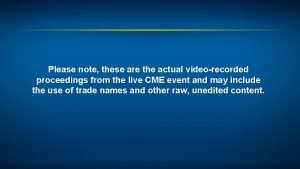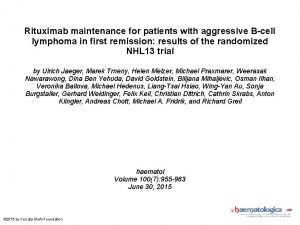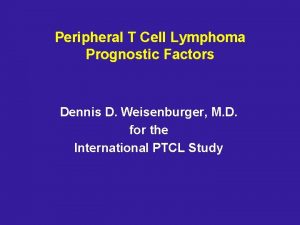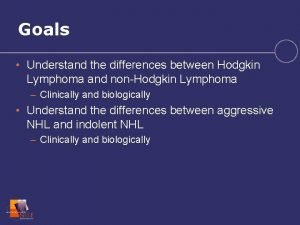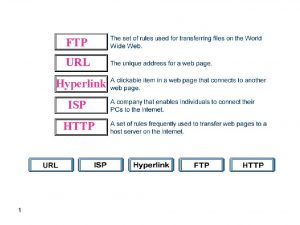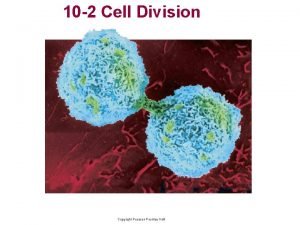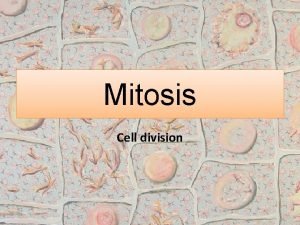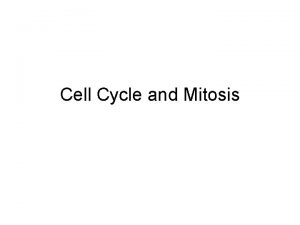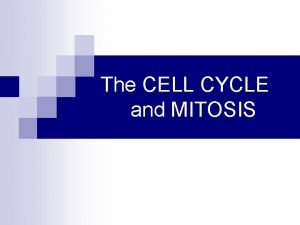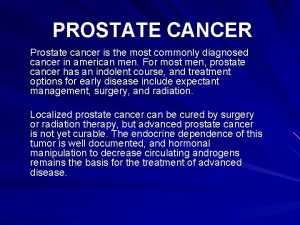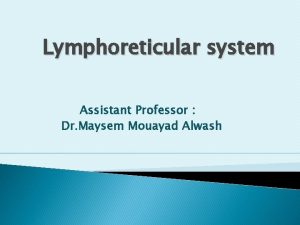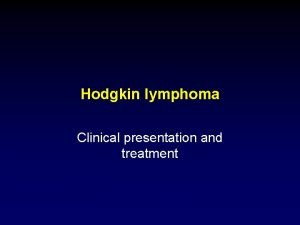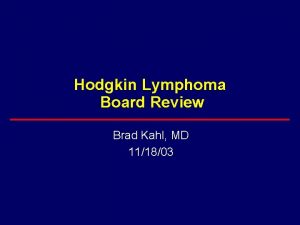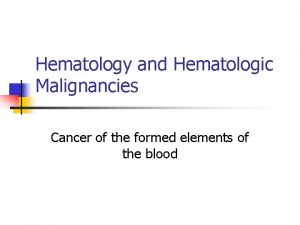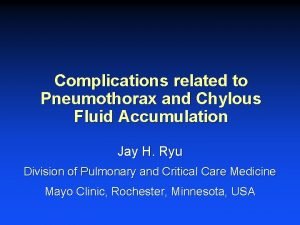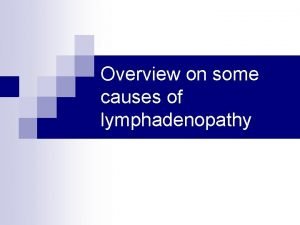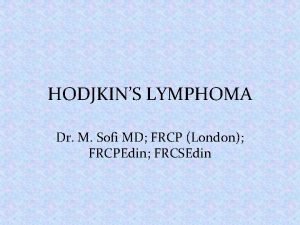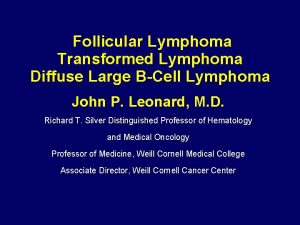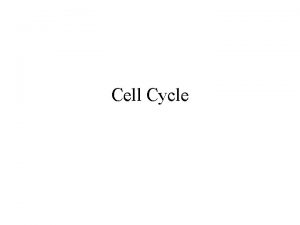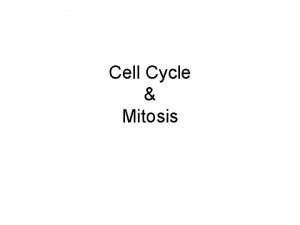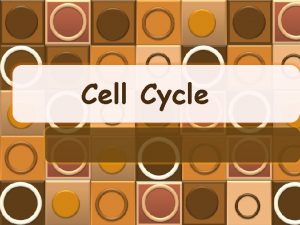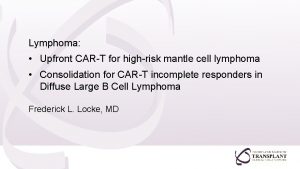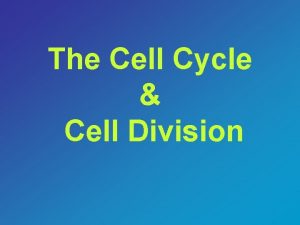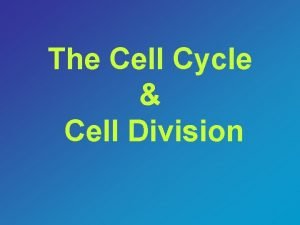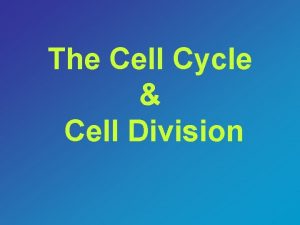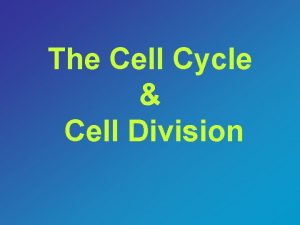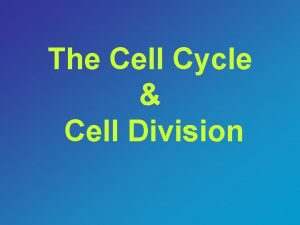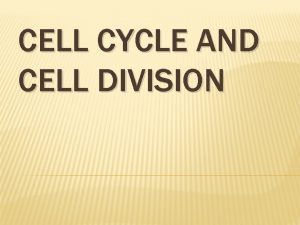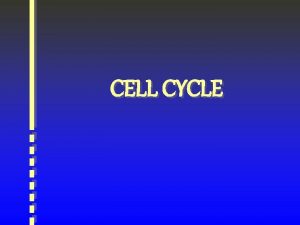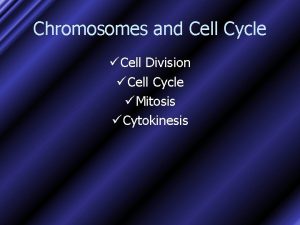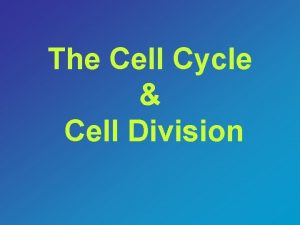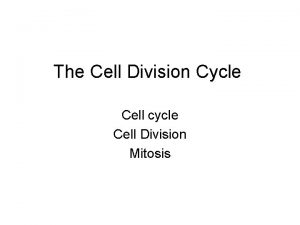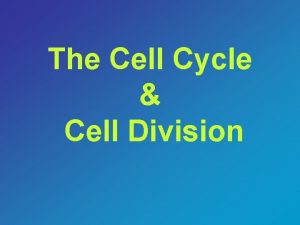Targeting the Cell Cycle in Lymphoma Therapy Selina































- Slides: 31

Targeting the Cell Cycle in Lymphoma Therapy Selina Chen-Kiang Weill Cornell Medical College


CDK Inhibitors Non-Selective CDK 4/CDK 6 inhibitors Targeting multiple CDKs, some are transcription factors • Flavopiridol CDK 9 • Daniciclib CDK 7 Selective CDK 4/CDK 6 inhibitors • PD 0332991 (palbociclib) Lymphoma, Myeloma Solid tumors-Breast Cancer (ER+/HER-) –Breakthrough therapy, combination with letrozole, Phase 3 • LEE 011 Breast Cancer –combination with letrozole and BYL 719, Phase 3 Melanoma • LY 2835219 Non-Small Cell Lung Carcinoma Breast Cancer

The Cell Cycle Positive Negative Go Cyclin D + CDK 4/6 M G 1 G 2 p. S-Rb-E 2 F Cyclin E + CDK 2 S p. ST-Rb CDK: Cyclin-Dependent Kinase p 18 INK 4 c (CDKN 2 C) E 2 F release p 16 p 15 p 18 p 19 p 21 p 27 p 57 mid-G 1 checkpoint

Targeting CDK 4/6 with PD 0332991 (palbociclib) • • • Selective CDK 4/CDK 6 inhibitor (IC 50 11 n. M) Orally bioavailable pyridopyrimidine Competing with ATP for binding to the kinase site of CDK 4/CDK 6 Induces early G 1 arrest Reversible Low in toxicity • Selectively and potently inhibits CDK 4/6 phosphorylation of Rb in primary human myeloma cells (IC 50 60 n. M ) • Inhibits tumor growth in the NOD-SCID human myeloma xenograft models and the immune-competent mouse 5 T models Fry et al. , 2004, Mol Cancer Ther Baughn et al. , 2006, Cancer Research Menu et al. , 2008, Cancer Research

Targeting CDK 4/CDK 6 in combination therapy CDK 4/6 Inhibitor Partner agent (low dose, selective ) Weill-Cornell Mantle cell lymphoma Multiple Myeloma Mantle cell lymphoma Phase I single agent Phase I/II PD-bortezomib-Dex Phase I PD 0332991 -bortezomib 2014 Mantle cell lymphoma Phase I PD 0332991 -Ibrutinib Multiple myeloma Phase I PD 0332991 -Lenalidomide-Dex

Prolonged early G 1 arrest (p. G 1) Hypothesis Go Cyclin D + CDK 4/6 M G 1 G 2 PD 0332991 p. S-Rb S Prolonged inhibition of CDK 4/6 Prolonged early G 1 arrest (p. G 1) Expression of only genes programmed for early G 1 Sensitizing tumor cells to cytotoxic killing

p. G 1 Hypothesis Go Cyclin D + CDK 4/6 M G 1 G 2 PD 0332991 Reversible p. S-Rb S Release of prolonged early G 1 block Cell cycle synchronization incomplete restoration of scheduled gene expression Further sensitizing tumor cells to cytotoxic killing

Targeting CDK 4/CDK 6 in Recurrent MCL Single agent PD 0332991 Phase I study • Inhibition of CDK 4/CDK 6 by PD 0332991 leads to prolonged G 1 arrest (p. G 1) and increased tumor-specific cell death in MCL (n=17) • PD 0332991 (125 mg/d orally 21 of 28 d) is generally well tolerated with neutropenia, fatigue and diarrhea as most common adverse events • 1 complete response, 2 partial response, 5 SD > 1 year Leonard, et al Blood 2012

Phase I study of PD 0332991 + bortezomib in patients with recurrent MCL Biopsy ★ ★ p. G 1 -S Martin, Di Liberto, Leonard, et al, unpublished

Phase I study of PD 0332991 + bortezomib in patients with recurrent MCL % change in tumor size (by patient) Martin, Leonard, unpublished

Inhibition of CDK 4/6 induces early G 1 arrest in MCL cells of both responders and non-responders initially. Can we identify genes that differentiate sensitivity from resistance to targeting CDK 4 in combination with bortezomib? M. Di Liberto, D. Chiron, C. Mason, P. Martin, J. Leonard, S. Ely, unpublished

Prolonged early G 1 arrest (p. G 1) Hypothesis Go Cyclin D + CDK 4/6 M G 1 G 2 PD 0332991 p. S-Rb S Prolonged inhibition of CDK 4/6 Prolonged early G 1 arrest (p. G 1) Expression of only genes programmed for early G 1 Sensitizing tumor cells to cytotoxic killing

Longitudinal Integrative analysis of whole exome-sequencing (WES) and whole transcriptome-sequencing (WTS) of serial biopsies, using cheek swab as a control.

Integrative WES and WTS analysis Lymph node biopsy CD 5+CD 19+ isolation WES (50 ng DNA) CNV SNVs WTS (100 -100 ng RNA) m. RNA abundance Alternative splicing

Only 1% of the genes that were repressed in (p. G 1, day 8) in clinically responding patients (R) were up-regulated in p. G 1 nonresponding patients (NR). Candidate biomarkers for the PD 0332991 -bortezomib therapy? Differential regulated genes • Glucose homeostasis • Redox homeostasis • Cell migration Chiron, Di Liberto, Mason, Martin, et al, unpublished

Targeting CDK 4 in combination with bortezomib in MCL • At the optimal PD 0332991 concentration and reduced bortzomib 1 CR, 1 PR, 2 near PR (43% reduction), 1 SD, 1 PD. • Inhibition of CDK 4 induces early G 1 arrest that controls cell cycle gene expression in all MCL patients initially. • MCL cells express CDK 4 but not CDK 6, cyclin D 1 but not D 2 or D 3 • CDK 4 is a stable target- no mutation in CDK 4 detected • A small number of genes are oppositely regulated in p. G 1 (day 8 vs day 0) in responders vs non-responders – candidate biomarkers for targeting CDK 4 in combination with bortezomib. Glucose homeostasis Redox homeostasis Cell migration

p. G 1 reprogramming MCL cells for ibrutinib inhibition of Bruton Tyrosine Kinase (BTK) Ibrutinib is effective in MCL. However, relapse is frequent and associated with aggressive proliferation and poor prognosis

Relapse-specific C 481 S mutation in BTK in MCL --Longitudinal integrative WES and WTS analysis Chiron, Di Liberto, Martin et al, Cancer Discovery, 2014

Relapse-specific C 481 S mutation in BTK in MCL --Longitudinal integrative WES and WTS analysis BTK C 481 S mutation undetected before Ibrutinib relapse At least two mechanisms of Ibrutinib relapse - • BTKC 481 S mutation is detected in durable ibrutinib response (>14 or 30 months, 2/2. • However, BTKC 481 S mutation is absent in transient ibrutinib response (< 5 months) or primary resistance (6/6) Chiron, Di Liberto, Martin et al, Cancer Discovery, 2014

• BTK is inactivated by ibrutinib in MCL cells of both sensitive and resistant patients in vivo • PI 3 K-AKT is activated in ibrutinib resistance BTK Sensistive Resistant BTKC 481 S Sensitive Relapse Chiron, Di Liberto, Martin et al, Cancer Discovery, 2014

Induction of p. G 1 by CDK 4 inhibition reprograms MCL cells for killing by ibrutinib via inhibition of BTK and AKT Chiron, Di Liberto, Martin et al, Cancer Discovery, 2014

p. G 1 inhibits NF-k. B activation in BCR signaling Chiron, Di Liberto, Martin et al, Cancer Discovery, 2014

Overriding ibrutinib resistance by cell cycle reprogramming • Integrative WES/WTS identified a BTK 481 S mutation at relapse from ibrutinib after a durable response in MCL • BTK 481 S mutation is absent in transient ibrutinib response or primary resistance, suggesting addition mechanisms for resistance. • BTK and AKT are concurrently activated in ibrutinib resistance. • Ibrutinib inactivates BTK in MCL cells of resistant patients. • Enhanced proliferation of MCL cells at relapse • p. G 1 sensitizes resistant MCL cells to Ibrutinib killing via cooperative inactivate BTK and AKT, and inactivation of NF-k. B. Chiron, Di Liberto, Martin et al, Cancer Discovery, 2014

p. G 1 reprogramming of MCL cells for PI 3 K inhibition regardless of C 481 S BTK mutation Chiron, Di Liberto, Martin et al, Cancer Discovery, 2014

p. G 1 reprograms MCL cells for PI 3 K inhibitor killing PI 3 Kd inhibitor GS-1101 (idelalisib) D. Chiron, M. Di Liberto, et al, Cell Cycle, 2013

Induction of p. G 1 sustains the inactivation of AKT by PI 3 Kd inhibitor in MCL cells D. Chiron, M. Di Liberto, et al, Cell Cycle, 2013

p. G 1 reprogramming for PI 3 K inhibition eradicates ibrutinib-resistant lymphoma cells independent of BTK mutation Cell death Live cells Chiron, Di Liberto, Martin et al, Cancer Discovery, 2014

p. G 1 reprogramming of MCL cells for PI 3 K inhibition independent of C 481 S BTK mutation in MCL

Future Directions • Mechanism of p. G 1 sensitization Cancer metabolism • Mechanism-based combination therapy for MCL Targeting CDK 4 with PD 0332991(palbociclib) in combination with ibrutinib Targeting CDK 4 in combination with PI 3 K inhibitor • Mechanism of resistance • Identification of biomarkers via longitudinal integrative WES/WTS and targeted sequencing

The Team Maurizio Di Liberto Xiangao Huang David Chiron David Jayabalan Selina Chen-Kiang John Leonard Peter Martin Adriana Rossi Ruben Niesvizky Tomer Mark Lewis Cantley Chris Mason Olivier Elemento Jihye Paik Scott Ely Steve Gross Tim Mc. Graw Jeff Sharman Patients NIH/NCI V Foundation Lymphoma Research Foundation Leukemia and Lymphoma Society Starr Cancer Consortium
 Rbac mantle cell lymphoma
Rbac mantle cell lymphoma Maintenance rituximab mantle cell lymphoma
Maintenance rituximab mantle cell lymphoma Hepatosplenic t-cell lymphoma
Hepatosplenic t-cell lymphoma Ann arbor staging system
Ann arbor staging system Selina stewart
Selina stewart Priska schär
Priska schär Unsent messages selina
Unsent messages selina Etf prevent
Etf prevent Projekt voda
Projekt voda We are what we eat
We are what we eat Cell cycle and cell division
Cell cycle and cell division Cell cycle and cell division
Cell cycle and cell division Biology.arizona.edu/cell bio/activities/cell cycle/01.html
Biology.arizona.edu/cell bio/activities/cell cycle/01.html Phases of cell cycle
Phases of cell cycle Joint targeting cycle
Joint targeting cycle Psychodynamic and humanistic therapies have in common
Psychodynamic and humanistic therapies have in common Bioness integrated therapy system price
Bioness integrated therapy system price Humanistic therapies aim to boost
Humanistic therapies aim to boost Hiv family name
Hiv family name Indolent non-hodgkin lymphoma quizlet
Indolent non-hodgkin lymphoma quizlet Difference between hodgkin and non hodgkin lymphoma
Difference between hodgkin and non hodgkin lymphoma Lymphoma
Lymphoma Lymphoma classification ppt
Lymphoma classification ppt Alcohol-induced pain in hodgkin lymphoma
Alcohol-induced pain in hodgkin lymphoma Clinical presentation of hodgkin's lymphoma
Clinical presentation of hodgkin's lymphoma Ann arbor staging system
Ann arbor staging system Lymphoma vs leukemia
Lymphoma vs leukemia Chylous ascites lymphoma
Chylous ascites lymphoma Classification of hodgkin lymphoma
Classification of hodgkin lymphoma Neoplasia
Neoplasia Hodjkins lymphoma
Hodjkins lymphoma Burkitt lymphoma
Burkitt lymphoma
